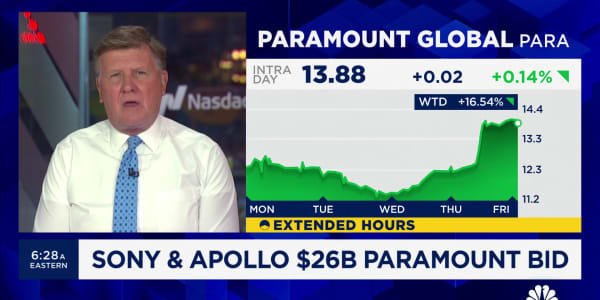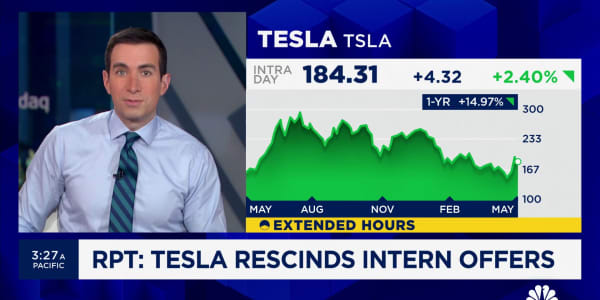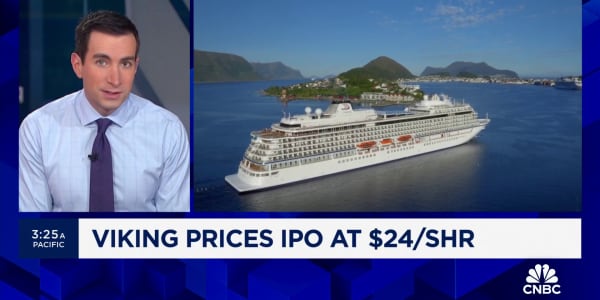Whoops!
Everyone knows it's been a boom year for business—market highs, with the earnings per share to match. In 2012, U.S. CEOs pocketed record paychecks—two in the top 10 earned more than $1 billion—and 2013 is expected to be even better.
But maybe all this easy money is making the C-suite a little lazy. With skyrocketing profits came a steady stream of corporate screwups. It's safe to say that insulting your customers's intelligence, realizing two weeks too late that 40 million of your customers' cards had been hacked, using 9/11 for product placement and sending users of your technology into the path of a commercial jet are all actions that leave something to be desired from the corporate world's best and brightest. And that's just a fraction of the "Are you kidding me?" moments provided this year by major corporations.
Here are 2013's biggest corporate blunders.
——By Anthony Volastro, Segment Producer, CNBC. Follow him on Twitter @VolastroCNBC
On the tarMac
2012 bared witness to a very rare mea culpa. CEO Tim Cook wrote a formal apology to the 100-million-plus iPhone users regarding Apple Maps' seemingly endless technical difficulties—from wildly incorrect results to less-than-precise location searches. But that's all in the past, right? Well ...
A little more than a year later, Apple Maps is still driving smartphone and tablet users in circles. In September there were several incidences where out-of-towners followed Siri's directions onto the active runway of Alaska's Fairbanks International airport.
No one wound up running into a Boeing 747, no injuries were reported, and the Apple maps app did indeed show some intelligence: It stopped at the runway, even if confused drivers proceeded past warning signs and out onto the tarmac.
The Hunger Shames
dealt with hordes of Black Friday shoppers this year—along with . The raucous crowds—organized by OUR Wal-Mart—demanded an annual salary of at least $25,000 for full-time employees. It probably didn't help that a week earlier, news of an Ohio Walmart holding a Thanksgiving food drive for its own employees went viral.
Wal-Mart's vice president of communications, David Tovar, defended the retail chain's food drive, saying, "It's unfortunate that an act of human kindness has been taken so out of context."
App-ology
Among the most solemn days of the year in America is 9/11. Corporate America does its part to "never forget," but in one particular instance this year, the connection failed. In a Twitter #blunder for the ages, learned the difference between paying respect to tragedy and taking advantage of it.
The telecom giant's official Twitter account showed a picture of a smartphone displaying the beaming towers of light emanating from Ground Zero. After getting blasted by Twitter followers, the company pulled the post after an hour and quickly issued an official apology. "We apologize to anyone who felt our post was in poor taste. The image was solely meant to pay respect to those affected by the 9/11 tragedy." Some customers threatened to switch carriers.
Pepperwrongi
Most customers probably wish they could get their pies delivered as fast as the company was texting them in recent years. This past May, the pizza franchise wrapped up a class action suit brought by irate costumers who alleged that they were blasted with unwanted texts containing pizza advertisements—a violation of the Telephone Consumer Protection Act. The company agreed to pay $16.5 million to settle the suit, with $11 million going to customers. According to Lawyers.com, each customer's slice of the class action suit will be $50 and a free pie.
Diss in a bottle
Nothing is more satisfying than popping open your ice-cold or Ballantine Ale and finding your fortune cookie–like tip of the day or riddle to help cool you down. 's vitaminwater offers its own brand of bottle-cap messages to promote its Glacéau energy brand in Canada. But when Edmonton resident Blake Loates opened up her bottle and received the message "You retard," it immediately heated things up. To make matters worse, Loates's sister suffers from both cerebral palsy and autism. Their father sent a note to Coca-Cola.
The company apologized, claiming it was a "genuine oversight in the review process" that originated during the manufacturing process—a result of randomly mashing up one word in English with one in French. The company has since halted printing the messages, but Shannon Denny, director of brand communications for Coca-Cola Refreshments Canada, warned, "At this time, we believe a very small number might contain this word." So have a Coke and an ... insult.
Naked truth
—maker of designer-brand yoga pants—has been riding high on the yoga craze that has swept the nation. The company appeared to have a firm hold over the market but was caught in two bad poses this year: a wardrobe malfunction and a PR nightmare to match.
Lululemon was forced to recall sheer yoga pants in the spring after complaints from yoga practitioners.
The company's founder and chairman, Chip Wilson, tried to spin the story, but his words led to anything but peace and tranquility.
Wilson said some women—with less-than-stellar bodies—shouldn't be wearing Lululemon's yoga apparel in the first place. He told Bloomberg Television, "Frankly, some women's bodies just don't actually work for [the pants]." Expanding on what parts of the body would be problematic for certain women, he explained, "It's really about the rubbing through the thighs, how much pressure is there over a period of time, how much they use it."
Shortly after those comments were made, Wilson resigned as chairman.
McStake
With a national discussion over minimum-wage pay for lower-income workers—like those hourly employees for major retail and fast-food chains— decided to offer a helping hand. It didn't come in the form of a bump in pay—which stands slightly above the national hourly rate—but through a helpful financial advisory McGuide, put together with the help of Visa, offering employees advice on how to get by on their paychecks.
The average McDonald's cashier makes $7.72 an hour, or $1,105 a month after taxes, according to Glass Door.The planning guide accounts for an individual working two gigs: one making the McDonald's monthly wage and another estimated to take home some $955. One main complaint about the guide was that after all the bills and savings were paid—if you followed the plan—there was no allowance in the budget for food. It also expects workers to maintain a daily spending habit of just $27.
McDonald's responded to CNBC inquires, explaining that doctors and lawyers spend more money than they make and that all types of professionals need financial guidance. Teo Reyes, the program director for Restaurant Opportunities Centers United—a nonprofit that fights for better working conditions—called the guide "insulting."
Courtside Heat
Would a year of corporate blunders be complete without a contribution from the cruise ship industry?
Cruising the Mediterranean attracts many travel romantics. However, last year's Lines' Costa Concordia disaster gave prospective seafaring customers second thoughts. It didn't seem to help Carnival install any better crisis-management protocols, either.
Carnival's experienced defeat when a massive engine fire left 4,200 vacationers stuck with overflowing toilets, food shortages and no air-conditioning.
As the PR machine picked up a few knots in its attempt to save face, CEO and Miami Heat owner was caught on camera in his courtside seat. It left many questioning why Arison was experiencing the usual luxury while his company's passengers prepared for sewage-borne diseases. Arison, who has been with the company since 1979, was replaced by Arnold Donald after a year of declining revenue. Donald's company created the artificial sweetener Equal.
XLusionary
knows how to market—loud music, dim lighting, hip decor and scantily clad male and female models greeting you at the door. It's a young and fit demographic, for sure, with the clothing to match. But extremely hip skinny jeans—among other items—have excluded many potential buyers. For many, the clothes just won't fit.
As more and more customers questioned the clothing lines' tiny sizes, Abercrombie & Fitch CEO Mike Jeffries responded by saying the company does not carry XL or XXL women's clothing, because it wants to cater to the "cool kids"—which to many critics implied the company has an exclusionary policy.
As hip became a PR slip, the company issued a statement: "We look forward to continuing this dialogue and taking concrete steps to demonstrate our commitment to antibullying in addition to our ongoing support of diversity and inclusion."
Jeffries survived the bruising and remains CEO—in fact, .
Mana-teed off
Speaking of a sensitive subject, here's some advice for Lululemon, Abercrombie and one more company that was weighed down by a blunder in 2013: To be safe, never talk to a woman about her weight.
Target, hit this holiday season with one of the of consumer information, faced problems earlier in the year as well. The "Expect More, Pay Less" retailer paid for its unexpected description of "more" in 2013 when a classy, flowing dress for sale on the company's site had a color described as "Dark Heather Gray." At least, in most of the sizes. The plus-size version—which had essentially the same color as the others—was labeled as "Manatee Gray."
Target pulled the item off the site until the color could be changed and issued a statement: "It is never our intention to offend our guest and we apologize for this unintentional oversight."
#hashtag-bash
Too-big-to-fail institutions get the brunt of Main Street anger—nothing new there. Wall Street fortresses were nearly stormed by Americans with pitchforks and torches in hand during the Great Recession. To help polish a tarnished image—especially in light of its recent $13 billion settlement with the DOJ— decided it might be best to reach the masses by connecting with the masses on .
The financial giant created the hashtag #AskJPM to promote a chat with one of its senior executives, Jimmy Lee. Turned out to be too dumb a social media move not to fail. The Twitter-verse bombarded the JPMorgan account with insults, slurs and zingers..





